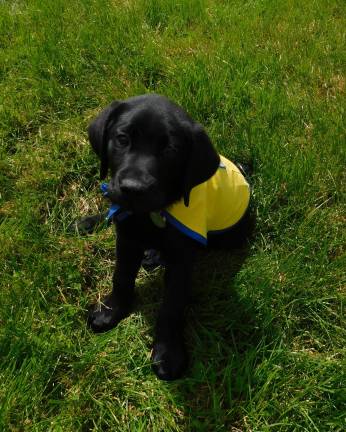'Neon IV' is a puppy with a purpose

By Mandy Coriston
Wriggling around on his back, chewing on a toy, it’s hard to believe that a little black Labrador named Neon IV is anything other than a typical 12-week-old puppy, but some day, he’ll have a very important job. Neon is being raised at Humming Meadows Alpacas in Hampton by Denise Spina for Canine Companions for Independence, a non-profit group which breeds, trains, and provides service dogs to individuals with a wide range of disabilities and conditions, from quadriplegia to PTSD.
Since arriving in New Jersey from California at eight weeks old, Neon has been Spina’s shadow as she undertakes his complete socialization and basic training.
“He goes everywhere with me,” she said, “He’s learning to behave himself in public and how to ignore distractions. He’s already been to the Kessler Institute to see patients and meet their facility dogs- you know, to check out the job.”
Spina said Neon is a big hit around town, running errands and even getting his own pedicure with her at the nail salon. Neon is the 26th service dog that Spina, a retired veterinary technician and dog trainer, has raised for a variety of organizations. Neon is her 8th CCI puppy.
“I was going to be done after 25,” she said, “But I needed to do this. He’s helping me as much as I am training him.”
Spina suffered a devastating arm injury last year, which forced her into retirement. Accompanying those changes, she said, was depression.
“I didn’t want to leave the house, I needed therapy, and I couldn’t figure out what my purpose was anymore,” she said, “My husband asked me what I thought would help me get back on my feet. The answer was obvious. I needed a puppy who needed a job.”
Neon will live with Spina until he’s 18 months old, and then he’ll be evaluated for health, obedience, and temperament. Once those tests are done, he’ll enter six months of intensive command training with other members of his puppy class. In the meantime, he’ll learn all his basic training from Spina and meet with a regional training group once a month. Spina is responsible for the costs of his upkeep, such as food and veterinary care, but CCI provides or covers the costs of training. This allows the organization to offer the dogs as service companions free of charge to their eventual recipients.
Dogs that complete all their training and meet the parameters to go into service are matched with potential companions over a two-week intensive meeting period. Dogs that don’t make the grade, most commonly for underlying health issues, are offered first to their raisers for a permanent home. If the raiser declines, the dogs are placed with other adopters. Spina thinks Neon has what it takes.
“He’s so calm and eager to learn,” she said, “Professionally, training these dogs over the years has been way for me to leave a legacy, to give back, and give people the comfort and independence that comes with a service animal. Personally, this puppy gives me so much joy. He’s so smart and so sweet. Raising and training him gives me a reason to get up and get going in the morning.”
Canine Companions for Independence is a non-profit organization founded in 1975 to train and provide service dogs to people in need. They currently train dogs to assist people with 27 different physical, neurological, and psychological conditions. For more information on becoming a puppy raiser, to apply to receive a dog, or to be placed on the waiting list to adopt a dog who is not entering service, www.cci.org.